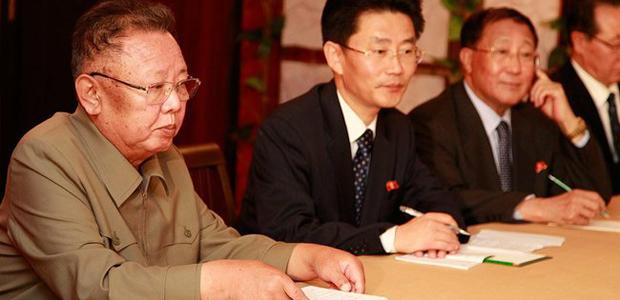South Korea on alert as North Korea mourns passing of Kim Jong Il
Kim Jong-il, left, died on Saturday in North Korea. On Monday in Korea, Sunday in the U.S., the government announced his death. (Photo via Wikimedia Commons.)
The death of North Korean leader Kim Jong Il came as a surprise to most in North Korea, depsite rumors for years that he’s been ill for years.
It was the start of the lunch hour on Monday when South Korean local news was interrupted by a special broadcast from North Korea.
A very emotional North Korean anchorwoman, wearing a traditional Korean funeral gown, announced that Kim Jong Il had died Saturday from a heart attack. She said he was exhausted from his work “to make North Korea a great nation.”
The South Korean government went into crisis mode.
Choi Bo-sun, a spokesman for the Ministry of Unification, the government body that deals with all North Korean matters, said in a national broadcast that Seoul is following established protocols and using long-established plans. He said a special commission has been created to monitor developments.
That might include whether the firing of a short-range missile off North Korea’s east coast late Monday was connected to Kim’s death. So far, South Korean government sources have said the two are not related.
President Lee Myung Bak has urged South Koreans to remain calm and go about their normal lives. Judging by reactions from Seoul, many South Koreans are doing just that. Many said they didn’t care about the death of North Korea’s leader; some even laughed.
But 25-year-old Yu Mi Hyun said people should care. Yu said she was in her office when she heard the news. At first she didn’t think it was a big deal.
“But after I spoke to friends in the military, I realized that this is really important,” she said.
A 56-year-old man named Seong, reading newspapers on a billboard outside the Seoul Press Center, had other concerns. He worried how Kim’s death might affect the economy.
“Everything in the market is going to change,” Seong said. “All sectors are going to be affected by his death.”
Seong had a point. South Korea’s KOSPI index took a 3.2 percent hit as news of uncertainty on the Korean peninsula reached investors abroad. But the uncertainty is raising hopes for some in South Korea — the 22,000 North Korean defectors.
Kim Hung-kwang, president of North Korea Intellectuals Solidarity, an organization made up of former North Korean elites, said he’s telling constituents not to get too excited. He said North Korea under a new leader can go one of two ways; it can become open to the international community and engage, or it could become even more militarized and even more dangerous.
But Kim Hung-kwang said now’s the time to reach out and counter the propaganda that painted Kim Jong Il as a hero.
He said even though many difficulties lie ahead, the day when he and other defectors can finally return to their home suddenly seems closer.
